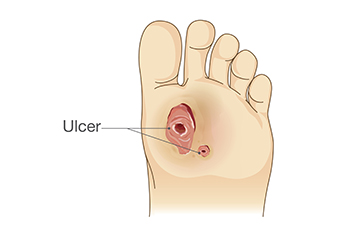
A foot ulcer is a serious wound. It is said to look like a crater in the skin and is generally found on the bottom of the foot or tip of a toe. Thick skin can gradually surround it and may act like a border. A foot ulcer can be common among diabetic patients, and immediate wound care is often sought for treatment and relief. A foot ulcer can range between being a surface wound to a deep wound, and both types can become infected if not treated. Diabetic patients can suffer from neuropathy, which is the inability to feel sensations on the feet. This may also be coupled with poor circulation, which may slow down the healing process. A foot ulcer that develops in people who have good circulation may heal in approximately six weeks, but it may take considerably longer in patients who have poor circulation. Treatment can begin with a podiatrist performing a debridement, which is trimming away diseased tissue. This can be followed by applying an appropriate dressing and recommending specialized footwear. If you have a foot ulcer, it is strongly suggested that you are under the care of a podiatrist who can successfully treat this foot condition.
Wound care is an important part in dealing with diabetes. If you have diabetes and a foot wound or would like more information about wound care for diabetics, consult with Dr. Richard DiMario from Maine. Our doctor will assess your condition and provide you with quality foot and ankle treatment.
What Is Wound Care?
Wound care is the practice of taking proper care of a wound. This can range from the smallest to the largest of wounds. While everyone can benefit from proper wound care, it is much more important for diabetics. Diabetics often suffer from poor blood circulation which causes wounds to heal much slower than they would in a non-diabetic.
What Is the Importance of Wound Care?
While it may not seem apparent with small ulcers on the foot, for diabetics, any size ulcer can become infected. Diabetics often also suffer from neuropathy, or nerve loss. This means they might not even feel when they have an ulcer on their foot. If the wound becomes severely infected, amputation may be necessary. Therefore, it is of the upmost importance to properly care for any and all foot wounds.
How to Care for Wounds
The best way to care for foot wounds is to prevent them. For diabetics, this means daily inspections of the feet for any signs of abnormalities or ulcers. It is also recommended to see a podiatrist several times a year for a foot inspection. If you do have an ulcer, run the wound under water to clear dirt from the wound; then apply antibiotic ointment to the wound and cover with a bandage. Bandages should be changed daily and keeping pressure off the wound is smart. It is advised to see a podiatrist, who can keep an eye on it.
If you have any questions, please feel free to contact our office located in York, ME . We offer the newest diagnostic and treatment technologies for all your foot care needs.